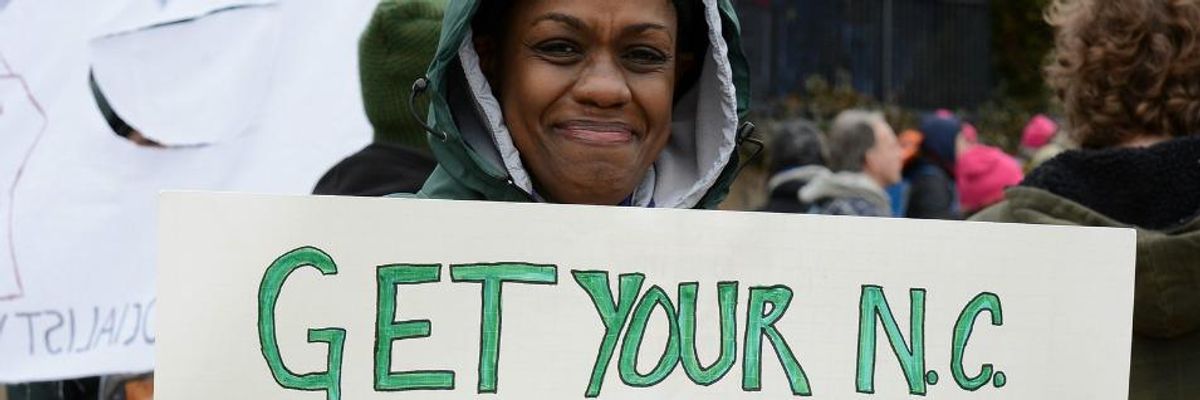In its recent decision striking down North Carolina's "monster voting law" for "target[ing] African Americans with almost surgical precision" and discriminating in both intent and outcome, a three-judge panel of the 4th Circuit Court of Appeals emphasized the historical discrimination that Blacks have encountered when seeking access to the ballot and made clear that the district court that previously heard the case "erred in ignoring or dismissing this historical background evidence."
Al McSurely, a longtime civil rights attorney who helped file the lawsuit in 2013, noted that lawyers for the NAACP argued not only that it was unconstitutional to deprive anyone of their right to vote but that it was morally wrong to target a group of people who had been denied their basic rights historically.
"Anytime you can argue both morally and constitutionally, you have a very strong argument," McSurely told Facing South.
For African Americans, the struggle to be recognized as human and to assert their rights as such has been a long-fought battle. When the Reconstruction Amendments to the U.S. Constitution were adopted between 1865 and 1870, freeing enslaved Blacks and making them citizens, Blacks were officially humanized in a way that they had not been for hundreds of years in America.
Indeed, while other amendments would effectively grant groups the right to vote -- women by the 19th Amendment, and 18- to 20-year-olds by the 26th -- no other amendment enfranchised citizens quite like the 14th Amendment granting citizenship rights to former slaves, or the 15th Amendment giving Black men the right to vote. That's because no other amendment covered a people who had previously been deemed subhuman and enslaved.
On the other hand, no other voting amendment would prove to be as malleable as the 15th Amendment. Despite being constitutionally granted the right to vote, Black men would be forcefully stripped of that right in the years following Reconstruction, and Black people as a whole would be deprived of basic human rights.
North Carolina was a site of particularly violent attacks on newly won Black voting rights. In 1898, less than 30 years after the ratification of the 15th Amendment and just as Blacks were beginning to collaborate with progressive whites to assert political power, embittered white supremacists killed up to 100 Black leaders and ran countless others out of Wilmington, which at the time was the state's largest city. The massacre occurred just days after Wilmington had elected a white mayor and biracial city council, showing that if given the ballot Blacks could assert themselves in significant ways. Instead, the white supremacists overthrew the elected government.
The Wilmington massacre and coup d'etat was part of a broader backlash against Black rights that ushered in Jim Crow laws throughout the South, relegating Blacks to second-class citizenship and depriving them of political power for almost 100 years -- until the passage of the Voting Rights Act of 1965, which McSurely calls "the special act that grew out of the 15th Amendment."
For 48 years, the Voting Rights Act required states and local governments with a history of voting discrimination to undergo federal preclearance before implementing election changes. Many of the covered jurisdictions were in the South, including 40 of North Carolina's 100 counties.
But then in 2013, the U.S. Supreme Court effectively struck down the law's preclearance requirement with its decision in Shelby County v. Holder. That case came out of Alabama, an important battleground for the people's movement that led to the passage of the Voting Rights Act. In fact, the Shelby County seat is only five miles from Selma, where voting rights marchers were beaten by police on Bloody Sunday as they attempted to march across the Edmund Pettus Bridge.
In his 2013 Shelby opinion, U.S. Supreme Court Chief Justice John Roberts acknowledged those who had been viciously beaten on Bloody Sunday. He also acknowledged the three civil rights activists -- Andrew Goodman, James Chaney, and Michael Schwerner -- who had been murdered near Philadelphia, Mississippi, during 1964's "Freedom Summer" for attempting to register African Americans to vote.
But instead of seeing this history of violence committed on those attempting to extend the franchise to African Americans as reason why the Voting Rights Act needed to be upheld in its entirety, Roberts justified softening the law by pointing to the fact that Selma, Alabama, and Philadelphia, Mississippi, are now governed by African-American mayors.
"History did not end in 1965," Roberts wrote.
In writing the opinion in the recent North Carolina voting case, Judge Diana Motz of the 4th Circuit Court of Appeals agreed with Roberts' statement about history. But then she went further:
Due to this fact, and because the legislation came into being literally within days of North Carolina's release from the preclearance requirements of the Voting Rights Act, that long-ago history bears more heavily here than it might otherwise. Failure to so recognize would risk allowing that troubled history to "pick up where it left off in 1965" to the detriment of African American voters in North Carolina.
As the nation marks the 51st anniversary of the signing of the Voting Rights Act into law on Aug. 6, it is important to remember that history did not end in 1965. With voting restrictions recently struck down in North Carolina and five other states and litigation pending in four others including Alabama, Georgia and Virginia, the history of the voting rights struggle is still being written today.


